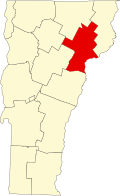Description and history
The former McIndoes Academy building stands in the Connecticut River village of McIndoe Falls, on the east side of US 5. It is set back from the road at the back of a broad green, and is accessed via Academy Lane, which loops around the green. It is a 2+1⁄2-story wood-frame structure, with a side-gable roof, clapboard siding, and a stone foundation. A square belfry topped by a cupola rises at the center of the roof, and a gabled four-column porch projects from the center of the front facade. The eaves of the main roof and projecting gable are adorned with paired brackets in the Italianate style. The main entrance is at the center of the front facade, flanked by sidelight windows and topped by a gabled pediment. [2]
The academy was established in 1853, during a period in state history when a number of private academies were established. This one was created by a local citizens' group and funded by subscription, and in part by in-kind donations of supplies and labor. Its construction was overseen by William Martin, a local master carpenter. It served the community as its main secondary school until 1969, and has since served in a variety of public uses, including as a library and museum. [2]
This page is based on this
Wikipedia article Text is available under the
CC BY-SA 4.0 license; additional terms may apply.
Images, videos and audio are available under their respective licenses.



